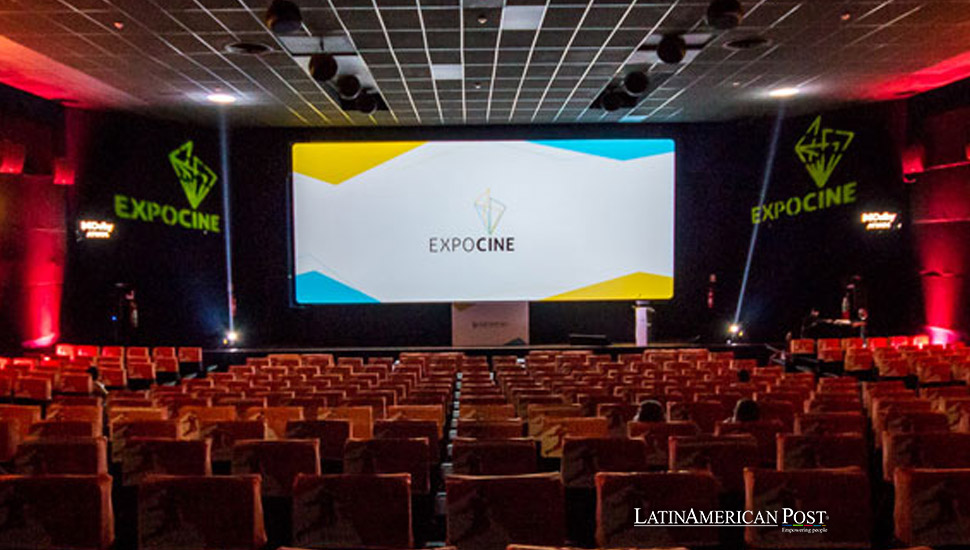Latin America’s Film Industry Seeks Boost at Expocine Brazil

Expocine 2024, Latin America’s most prominent movie theater trade show, returns to São Paulo. The four-day event offers critical business opportunities for distributors and exhibitors as Brazil’s cinematic market recovers from the pandemic and Hollywood strikes. It highlights the industry’s resilience and future outlook.
Brazil’s Cinematic Market on the Rebound
As Brazil’s cinematic industry emerges from the challenges posed by the pandemic and the ongoing Hollywood strikes, Expocine 2024 offers a much-needed platform for distributors and exhibitors to reconnect, strategize, and plan for the future. Hosted in São Paulo from October 8-11, this year’s event highlights both the industry’s difficulties and the optimism surrounding its recovery.
Brazil’s movie screens have slowly increased to 3,530, slightly higher than the 3,507 available pre-pandemic. However, the box office (B.O.) has not returned to its previous highs. “Brazilian exhibitors are resilient,” Lucio Otoni, president of the Federation of Exhibitors in Brazil (FENEEC), told Variety. “We have reasons to believe that 2025 and 2026 will be better, not only because we will have a stronger lineup of films but also because the Brazilian economy is improving.”
The impact of Hollywood’s double strike on the availability of U.S. films has been felt across the industry. While box office numbers are slowly rising, the lack of new international blockbusters has made the recovery more sluggish than anticipated. Nonetheless, Expocine 2024 provides hope that the market will continue to regain momentum, especially as new business opportunities emerge from the event.
Expocine’s Role in Strengthening Business Connections
Expocine is not just a trade show but the beating heart of Latin America’s movie theater business. In its 11th edition, the event continues to grow in importance, especially in a post-pandemic world where reconnecting in person is vital. “Expocine also counts on a strong presence of industry executives from other South American countries, particularly from Argentina, Chile, Uruguay, and Paraguay,” Marcelo Lima, CEO of Tonks and Expocine’s organizer, told Variety. He emphasized that the event’s strategic location in São Paulo and unfavorable exchange rates on other continents have made Expocine the go-to event for Latin America’s film industry.
This year’s Expocine brings together a diverse array of participants, with 70% of attendees from the exhibition and distribution sectors and 30% comprising film producers, theater equipment providers, and service companies. The trade fair, which occupies two floors of the Renaissance Hotel, offers exhibitors and distributors access to the latest cinema technology, concessions, and other critical services.
“Expocine allows small and medium-sized players to compete on an equal footing with the industry’s biggest names,” Otoni told Variety. For smaller exhibitors, many of whom operate family-owned businesses, the event is an opportunity to access information and resources that may otherwise be out of reach. The event’s panels and workshops also help to demystify new technologies and trends, equipping these businesses to keep up with changes in the industry.
Industry Leaders Shape Cinema’s Future
The theme for Expocine 2024, “Connecting the cinema to the future,” captures the essence of the event’s forward-looking focus. Key industry figures, such as Hernán Viviano (VP Latam at Warner and Universal), Iafa Britz (director of Migdal Filmes), and Marcio Fraccaroli (general director of Paris Filmes), are among the prominent speakers sharing insights on the future of film in Brazil and Latin America.
“This year’s event is all about adapting to the future, especially with the advent of AI and Brazil’s upcoming tax system changes,” Lima explained to Variety. Panels cover a range of relevant topics, including the impact of artificial intelligence on the industry, international co-productions, and how to attract younger audiences to the cinema. Other discussions explore the implications of social media on movie attendance and the continued popularity of authentic crime narratives.
Expocine represents a prime opportunity for distributors to showcase their upcoming releases to exhibitors from across the country. “Distribution is about seducing the exhibitors, making them believe in my film,” Igor Kupstas, director of O2 Play, told Variety. Kupstas’ presentation of Francis Ford Coppola’s Megalopolis, set to release in Brazil on October 31, exemplifies the high-stakes nature of these events. “I’m competing with other distributors. The presentation is my chance to convince them, to make them think about my film,” he added.
Fraccaroli of Paris Filmes echoed Kupstas’ sentiment, explaining to Variety that Expocine is also a pivotal moment for Brazilian films. “Our presentations of Brazilian films are made by directors, actors, and screenwriters, who are the best to talk about their films,” he said. These interactions between creators and exhibitors help build confidence in local productions, which is critical to maintaining cinema attendance amid the current shortage of U.S. films.
Empowering Small and Medium Exhibitors
One of Expocine’s greatest strengths lies in its ability to empower small and medium-sized exhibitors, who comprise a significant portion of Brazil’s cinema landscape. According to Otoni, Brazil has one of the least concentrated theatrical markets in the world, with over 100 smaller exhibitors accounting for nearly half of the country’s movie screens. “The big players, Cinemark, Cinepolis, Kinoplex, Araujo, and UCI, shared 59% of the total 118 million ticket sales, 65% of the 2.3 billion reais ($474 million) B.O., and 46% of the screens in the country in 2023,” Otoni told Variety.
For these smaller players, many of whom are family-owned businesses, Expocine is an invaluable resource. The event provides a space for exhibitors to access information about upcoming films, attend panels and workshops, and connect with suppliers. With its extensive offering of theater equipment and services, the trade fair ensures that even the most minor exhibitors have access to the tools they need to thrive in a competitive market. “Expocine allows these small players access to information about the upcoming films, on a par with the big exhibitors,” Otoni explained.
This year’s expanded trade fair, occupying two floors of the Renaissance Hotel, includes booths from theater equipment providers, concessions manufacturers, and service providers. These businesses rely on Expocine to stay up-to-date with the latest technological innovations and trends in the cinema industry. For many exhibitors, the trade show is a rare opportunity to meet with suppliers and negotiate deals that could define the future of their business.
As Brazil’s cinema industry recovers from the pandemic and the challenges posed by the Hollywood strikes, Expocine 2024 stands as a beacon of hope and opportunity. The event brings together distributors, exhibitors, and service providers across Latin America, providing a space for collaboration, innovation, and strategic planning. Whether through the exchange of ideas in panels or the latest in cinema technology at the trade fair, Expocine plays a critical role in shaping the future of Brazilian cinema.
Also read: Brazilian Court Denies X’s Request to Exempt Subsidiary from Legal Responsibility
The event is especially vital for small and medium-sized exhibitors, offering a chance to level the playing field with larger companies and stay competitive in an evolving market. As the industry looks forward to 2025 and beyond, the optimism expressed by leaders like Otoni and Lima reflects Brazil’s cinema sector’s resilience and determination to thrive in the years to come.





